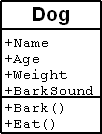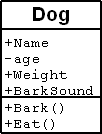Difference between revisions of "OOP Class6"
| Line 194: | Line 194: | ||
* Create fractions from two numbers x/y or from whole numbers | * Create fractions from two numbers x/y or from whole numbers | ||
| − | * Convert fractions to | + | * Convert fractions to whole numbers int |
* Convert fractions to float or double | * Convert fractions to float or double | ||
| − | * | + | * override ToString() to describe Fraction |
Revision as of 16:36, 9 October 2007
Contents
access-modifiers
public +
- most permissive access. No restrictions on access
private -
- least permissive access level. Only available to the class in which it was declared
protected #
- accessible within its class and by derived classes
internal
- accessible only within files in the same assembly
protected internal
- combination of protected and internal
Properties Private instance data members - accessors
Micorsoft has stared calling private varables with accessors Properties
Private class memebers the use get and set keyword to set and retrieve data. Get and set are known as accessor methods private members are helpfull when you want to also do other things when a data member is changed or change the rutern value under certian conditions. C# Programmer's Reference - Accessors http://msdn.microsoft.com/library/default.asp?url=/library/en-us/csref/html/vclrfaccessorspg.asp. Lastly accessor also make read only and write only variables possible
<csharp>//private string color read/write private string color;
public string Color {
get
{
return color;
}
set
{
color = value;
}
}
//private string color read only private string color;
public string Color {
get
{
return color;
}
}</csharp>
Another property that is a good candidate for a private instance data member is the dogs age
<csharp> private string age;
public int Age {
//age can only be accessed with get there is no set accessor
//age must be set with HappyBirthday()
get
{
return age;
}
}
public int HappyBirthday() {
age++; return age;
}
</csharp>
In class
In Class Project
*Build a Dog class with a private variable called age. *Make a public Accessor for the private age the is read only *Make a method that increments the age of your dog *MAke a test class for the new property and accessor
Here's a class of dogs that return different color depending on whether on not they are clean. It uses private private instance data members
Real barking dogs...
an example of how you don't need to know how all of the classes work just how to use them
aka Shared Properties
Static - A type of member modifier that indicates that the member applies to the type rather than an instance of the type
<csharp>public class Dog { //some code
static private int dogCount; // total number of dogs
public Dog() { barkSound = "Woof!!!"; //Add a dog to the total dog count dogCount++; } public Dog(string newName) { name = newName; barkSound = "Woof!!!"; //Add a dog to the total dog count dogCount++; }</csharp>
Static dougCount Example
dogStatic.cs - source
Operator Overloading
You can overload operator in c# just like you overload constuctors
* Operator Overloading In C# - www.csharphelp.com * Operator Overloading in C# - HowToDoThings.com
<csharp>//Overloading unary operators public static return_type operator op (Type t) {
// Statements
}
//Overloading binary operators public static ClassType operator + ( object lhs, object rhs ) {
ClassType c
//code to implement class addition return c; }</csharp>
dog addition? extra credit
How could you overload + operator so that it returns a new dog when two dogs are added together...
Operator Overloading Fraction Class
<csharp>public static ClassType operator + ( object lhs, object rhs ) {
ClassType c //code to implement class addition return c;
}</csharp>
Operator also refer to implicit and explicit conversions. Fractions make a good example for opertor overloading. Fraction class
* Create fractions from two numbers x/y or from whole numbers * Convert fractions to whole numbers int * Convert fractions to float or double * override ToString() to describe Fraction
Fraction Class Example of operator overloading.
fractionConv.cs - source
Fraction class with implicit and explicit conversion
fractionConv_NoTest.cs - source
Fraction class with overridden operators
fractionConvOver.cs - source
In class build a test application does thigs with frations.
Using
http://iam.colum.edu/oop/gbrowser.php?file=/classsource/class5/fractionConv_NoTest.cs fractionDone_NoTest.cs] create a test class that...
- Creates a fraction out of integers (ie cast int into fractions)
- Adds, subtracts, and reduces some fractions
- Creates floting point numbers out of fractions (is cast fraction into double)
- Checks the eqaulity of some fractions
Class Relationships
Four Class Relation ships
- Association - 'Uses A'
- Containment - 'Has A'
- Inheritance - 'Is A'
- Interfaces - implements or derives from We'll do this next week in OOP Class6
Association - 'Uses A'
A dog uses a hydrant to relieve them self.
<csharp>//Dog simple class definition public class Dog {
//some dog code...
public void Relieve(Hydrant h)
{
h.Clean = false;
}
}
public class Hydrant {
public string Color; //the color of the hydrant
public bool Clean; //if the hydrant is clean or dirty
public Hydrant()
{
Color = "red";
Clean = true;
}
public override string ToString ()
{
if (this.Clean == true)
{
return ("The " + this.Color + " hydrant is clean.");
}
else
{
return ("The " + this.Color + " hydrant is not clean.");
}
}
}</csharp>
Dog Association example DogHydrant.cs - source
Containment - 'Has A'
A dog has an owner
<csharp>Dog fido = new Dog("fido");
fido.Owner = new Person("Sue");</csharp>
<csharp>//Dog simple class definition public class Dog {
public string Name; // the dog's name
public string BarkSound; // the sound of the dog's bark
public Person Owner; // the dogs owner
public Dog(string dogName)
{
Name = dogName;
BarkSound = "Woof!!!";
}
public string Bark() {
string s;
s = this.Name + " says " + this.BarkSound;
//Make sure the the dog has an owner
if (!(this.Owner == null))
s += "\n" + Owner.Name + " says be quiet.";
return s;
}
}
public class Person
{
public string Name; //the color of the hydrant
public Person(string newName)
{
Name = newName;
}
}</csharp>
Containment example
DogOwner.cs -source
Structs
- remember these from week 2
Lightweight alternatives to classes. Structs do not support inheritance or destructors. Structs are value typed objects similar to ints bool etc... while classes are refence types. Structs are more memory efficient and and faster than classes. Syntax
[ attributes] [access-modifiers] struct identifier [:interface-list {struct members}
<csharp>struct Dog {
public string name; public string weight; public int age;
}</csharp>
This is a pretty lightweight dog and is pretty useless as a dog (It's can't even bark what fun is that) so I won't make an example.
A good example of a stuct would be and something like a point. There may be many many points in a structure or graph and we would want the points to be a lightweight as possible. Since the point object won't have an methods this is a good time to use a struct.
<csharp>struct Point {
public int x; public int y;
public Point(int x, int y)
{
this.x = x;
this.y = y;
}
public Point Add(Point pt)
{
Point newPt;
newPt.x = x + pt.x;
newPt.y = y + pt.y;
return newPt; }
}</csharp>
and the this keyword
<csharp>//Accessor for private color allow color to be set and return color or 'dirty' + color
public string Color
{
get
{
//if current dog isClean the return dogs color
if (this.isClean == true)
{
return color;
}
//else return 'dirty' and the dogs color
else {
return "dirty " + color;
}
}
set
{
color = value;
}
}</csharp>
console /infod/jeff/classSource/class4/dogAccessor.cs - source web /infod/jeff/classSource/class4/dogAccessor.aspx - source
Dog private members, Overloaded with method class definition
<csharp>//Dog private members, Overloaded with method class definition public class Dog {
private string name; // the dog's name
private int age; // the dog's age private int weight; // the dog's weight private string barkSound; // the sound of the dog's bark private int barkCount; // how many times the dog has barked
public Dog() { barkSound = "Woof!!!"; } public Dog(string newName) { name = newName; barkSound = "Woof!!!"; } public Dog(string newName, string newBarkSound ) { name = newName; barkSound = newBarkSound; }
public string Name { get { return name; } set { name = value; } } public int Age { get { return age; } set { age = value; } } public int Weight { get { return weight; } set { weight = value; } } public string BarkSound { get { return barkSound; } set { barkSound = value; } } public int BarkCount //you can't set bark count //it only increments from the Bark() method { get { return barkCount; } }
public string About()
{ //return a string with some information about the dog
string about = "";
//this refers to current object about +=("\nThe dogs name is " + this.name + "."); about +=("\nIt is " + this.age + " years old."); about +=("\nIt weighs " + this.weight + " lb(s)."); about +=("\nIts bark sounds like '" + this.barkSound + "'"); about +=("\nIt has barked " + this.barkCount + " time(s)" );
about += about.Replace("\n","
");
return about;
}
public void Bark() { //make dog bark Console.WriteLine (this.Name + " says " + this.barkSound); //add 1 to the number of times the dog has barked this.barkCount++ ; } public void Eat() { //put eat code here } }</csharp>
console
In class
Discuss Dog Diagram
Pair Programming
We are going to pair off to do our next assignment. Many of the paired programming principles come from XP (http://www.extremeprogramming.org/ Extreeme Progamming)
Pairs are good because
- Pairs keep each other on track
- A partner can help when you are stuck
- Keep each other accountable
Some XP Principles
Fail - If you are having trouble succeeding fail.
Baby Steps - Do the smallest thing that you possible can that moves you in the right direction
If you do decide to dive and conqure the problem please remember that integration process is unpredictable and can be quite difficult. Try to integrate your code often. Try posting up your code and emailing or plan on meeting several times.
When topair programmers are together one you should sit a one computer (yeah that right two of you at one computer) and one should type while the other watches and reflects. Feel free to slide the keyboard back and forth when someone get tired, stuck or has a new idea.
I would like you and your paired partner to create and demonstate classes in c# from the diagram below.
Homework
use Pair Programming to make tests and classes from the following UML
If you need to ad anysupprting methods or propertites that are not on the diagram feel free.
Create a UML Diagram of your c# classes (not the tv and radio yeah the pong machine and ninja and kungfumonkey and stuff)
READ
Chapter 2 Introducin the UML in The Unified Modeling Language Users Guided (hand out)
Chapter 4 Classes in The Unified Modeling Language Users Guided (hand out)
quiz #2 next week

